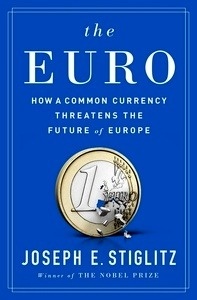The Euro, How a Common Currency Threatens the Future of Europe

Editorial Norton
Fecha de edición mayo 2016 · Edición nº 1
Idioma inglés
EAN 9780393254020
304 páginas
Libro
encuadernado en tapa dura
Resumen del libro
The Nobel Prize winning economist and best-selling author explains why saving Europe may mean abandoning the euro.
The euro was supposed to bring Europe closer together and promote prosperity; in fact, it has done just the opposite. The 2008 crisis revealed the shortcomings of the euro, and Europe's stagnation and bleak outlook are a direct result of the fundamental flaws inherent in the EU project economic integration outpacing political integration with a structure that promotes divergence rather than convergence. The question then is: Can the euro be saved?
Laying bare the European Central Bank's misguided inflation-only mandate, and explaining why austerity has condemned Europe to unending stagnation, Joseph E. Stiglitz outlines three possible ways forward: fundamental reforms in the structure of the Eurozone and the policies imposed on the member countries suffering the most; a well-managed end to the European Union; or a bold, new system dubbed the flexible euro. With its lessons for globalization in a world economy ever more deeply connected, The Euro is urgent and essential reading.
Biografía del autor
x{0026}lt;P x{0026}lt;B Joseph E. Stiglitzx{0026}lt;/B , Premio Nobel de Economía en 2001, es actualmente catedrático de economía en la Universidad de Columbia tras una intensa carrera académica en prestigiosas universidades, como Yale, Oxford y Stanford. Además, ha sido asesor económico del gobierno de Bill Clinton y economista jefe y vicepresidente senior del Banco Mundial. Autor del x{0026}lt;I bestsellerx{0026}lt;/I internacional x{0026}lt;I El malestar en la globalizaciónx{0026}lt;/I (Taurus, 2002), también ha publicado x{0026}lt;I Los felices 90x{0026}lt;/I (Taurus, 2003), x{0026}lt;I Cómo hacer que funcione la globalizaciónx{0026}lt;/I (Taurus, 2006), Cx{0026}lt;I omercio justo para todosx{0026}lt;/I (Taurus, 2007), x{0026}lt;I La guerra de los tres billones de dólaresx{0026}lt;/I (Taurus, 2008), x{0026}lt;I Caída librex{0026}lt;/I (Taurus, 2010) y x{0026}lt;I El precio de la desigualdadx{0026}lt;/I (Taurus, 2012).x{0026}lt;/P








